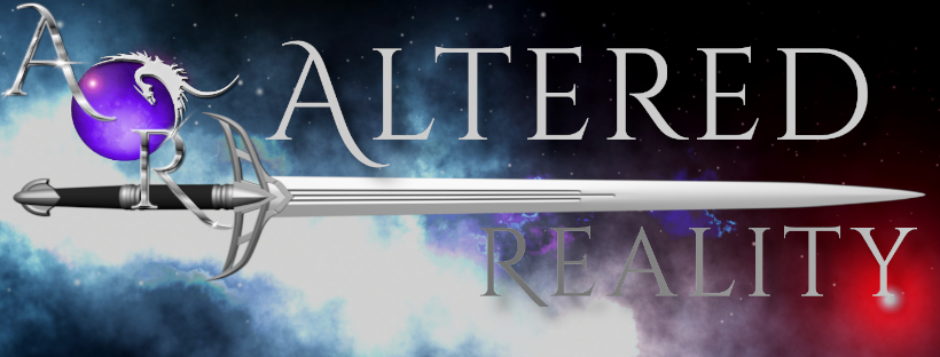A.R. Do you write poetry, prose, or a mixture of both?
J.D. I write both for Altered Reality. As part of my main job, I also write science articles and popular science. I am a designer of tabletop role-playing games, as well, which involves a lot of writing, as the game comes in book form. I used to write plays, and have had a few produced.
A.R. Have you every done any journalistic writing?
J.D. Yes, I have published many articles in popular science magazines, especially Nautilus.
A.R. What made you start writing?
J.D. I’ve always been interested in producing things. I paint, draw, and I used to be very much into theater. The thing I like about fiction is that you can create the whole package by yourself, without relying on actors, directors, and lighting designers. Even if your work isn’t published, you can hand it to a friend and they can get the whole experience as intended.
A.R. How old were you when you started writing?
J.D. My fiction writing started in earnest when I was around 22 years of age. I wrote my first novel then, mostly on a Palm Pilot! Since then I’ve written three novels and a novella, none of them published. My work for Altered Reality, the serial “Eve Pixiedrowner and the Micean Council,” is the biggest fiction project I’ve ever published.
A.R. Where do you get your inspirations?
J.D. I like to analyze media that really moves me, ask myself what it is about that story that is really doing it for me, and then try to think of how I might incorporate that abstract quality into a story in one of the story worlds I’ve created. So I might watch a heist movie, and think “how could I make a heist story with mice?” and jot down some plot ideas. In this way I try to make consuming media a productive, idea-producing activity. Once I have a built story-world that’s rich enough, I can generate stories in it fairly easily. One trick to building a good story-world is to have some kind of conflict built into its DNA: factions of characters whose goals are at odds. A good story-world should be a drama generator, where narratives can emerge from acts of nature, or previous events. Star Wars is a great example of this–using magic in this world leads some people to evil, and those people must be stopped. This will always be true. In my world, there are creatures who want to exploit humans, and mice and owls who try to stop them. The problem will never be solved, and the eternal struggle can create endless stories.
A.R. What is the one thing you hate most about writing?
J.D. That I’m not better at it! I’d have thought I’d be much better after doing it for 20 years. I still have many of the same problems with my writing that I started out with, in spite of trying to fix them through practice, participating in writer’s groups, lots of great, detailed advice from the editor of Altered Reality, and by reading lots of books on writing. The slow progress is one reason you really have to enjoy the writing process–not just publishing or getting acclaim from others, but actually writing.
A.R. What is the one thing you like most about writing?
J.D. In film, animation, theater, and even comics to some extent, creating elaborate set pieces has a direct influence on the budget. If you are doing fantasy, or a period piece, or have a big cast, it’s going to cost you. But in fiction you are free to create whatever story you want, in whatever world you want, without having to worry about budget. Words are cheap. It’s very freeing.
A.R. When is inspiration most likely to strike you?
J.D. I get inspired by things all the time: the trick is to get a good system down for idea capture. I keep index cards and a pen in my pockets at all times. I have an app on my cell phone that does nothing but send myself an email with fewer taps. I have google docs full of fragments of ideas. I never go to a poetry reading without a notebook to write down the things that pop into my head. I harvest these ideas later, forming them into plots, characters, and situations. Because of this I always have more planned stories than I have time to actually turn them into prose. I think the more important question isn’t about inspiration, but perspiration. I write a thousand words a day (of something, fiction or non-fiction). I do this every morning, inspiration or no!
A.R. Do you do any other sort of art?
J.D. Yes, I’m a real dabbler. I draw, do calligraphy, play guitar and piano. I did theatrical improvisation for about 20 years. My first book, Riveted, was about the science of why we find things compelling, including art.
A.R. If you could invite any one other author or poet over for dinner, who would you invite?
J.D. If we include non-fiction authors, I’d pick Steven Pinker. In terms of fiction, it would be Stephen King. Sounds like I have a thing for Stevens, but it’s coincidence…
A.R. Why?
J.D. King is masterful with character work and writing about inner thoughts. It’s amazing how good some of the movies based on his books are, because his prose is so full of his character’s thoughts–sometimes page after page of it. To me, that’s what makes fiction really special. Communicating inner thought in other media is much more clumsy and difficult. In fiction, it’s expected and feels natural.
A.R. What would you talk about?
J.D. I’d ask him about whatever specific problem I was working on in my fiction, and get his thoughts–but the main purpose would be to set up a friendship.
A.R. What would you serve for the meal?
J.D. Meat and potatoes. King is famous for not liking fancy food. I’d roast a chicken and mash some potatoes for him. Pie for dessert.
A.R. If you received the bad news that you only had thirty days to live, what would you do?
J.D. I’d wrap up everything in my life so that my wife had as easy a time as possible with the transition. I would either sprint to finish whatever I was writing or offer my unfinished writing to people I thought might be able to do something with it. I’m always in the middle of writing at least one book. Then I’d spend the rest of the time travelling around, saying goodbye. What a dark question!
A.R. Thinking about all of your characters, which one are you most like?
J.D. Beatrice Brownbrow, leader of the Ottawa Micean Council. She’s not out there battling, but her heart is in the right place and she helps others do good. That’s what I want to be like, anyway.
A.R. Thinking about all the characters you’ve ever seen in movies, plays, tv shows, or read about, which are you most like?
J.D. Maybe Leo Fitz from the Agents of S.H.I.E.L.D. TV show. But that was hard to come up with. I’ve never thought about this before and I have never spontaneously thought “that character is just like me!”
A.R. What do you tell people that say “I want to be a writer.” ?
J.D. I tell them that that’s wonderful. You can do it into old age, and it has all the other benefits I’ve described above. I’d only offer advice if asked.
A.R. Why do you tell them that?
J.D. I’m a man and a professor, two classes of people prone to delivering unwanted lectures, so I try not to give advice unless asked for it. But I want to be encouraging. I believe writing is good for your mind, even if nobody reads what you write. This has been supported by studies showing that journal writing is beneficial to your mental health (the book “Redirect” is a good review of this literature.)
A.R. What do you want on your tombstone?
J.D. Another death question! It’s my writing that will outlast me; what’s on my tombstone isn’t important to me. I just hope the death year is a really, really big number.
A.R. Any last words?
J.D. If you want to write, try to get a couple of other people around your same skill level and meet regularly to share what you’ve done–you’re be more productive and enjoy the process more (here I go, giving advice again). If you love to read, send authors messages about what you like. These little notes are really appreciated!
![]()





